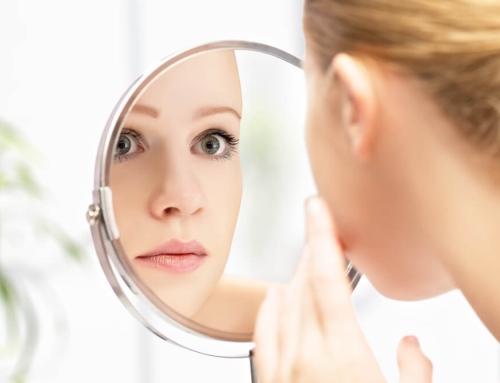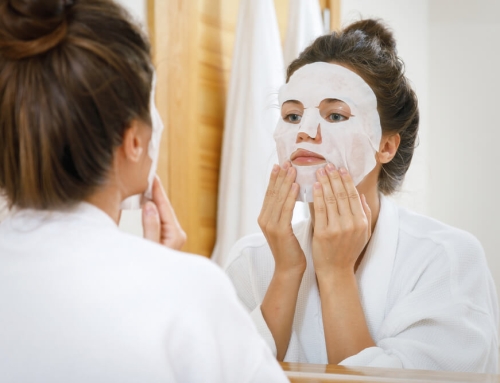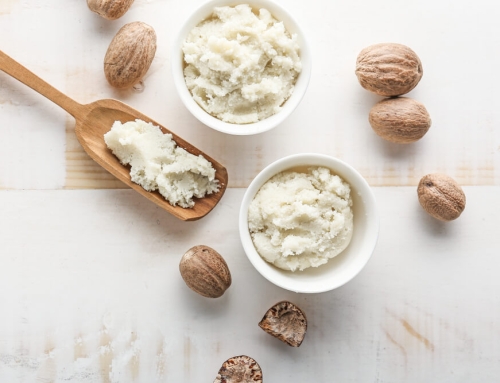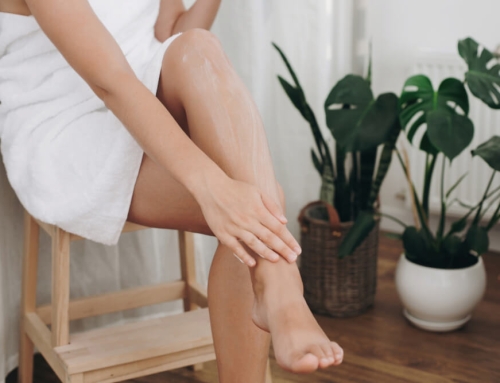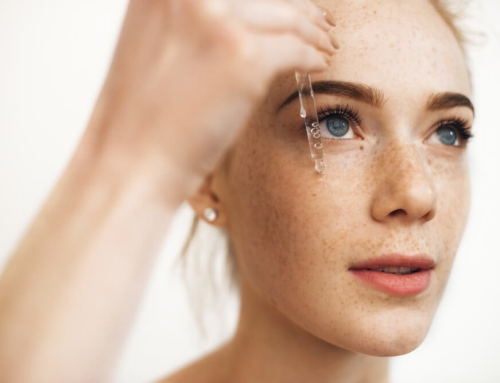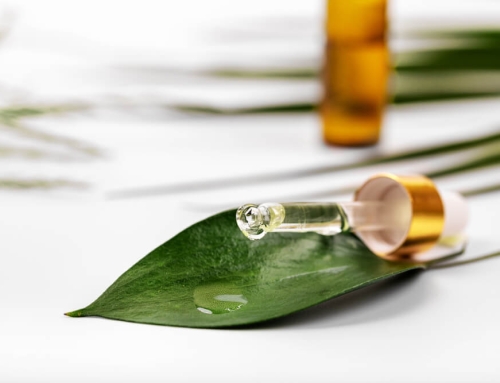Anti-aging skin care products are great, but there is only so much that they can do when your skin is being bombarded by external factors that accelerate the aging process. There are six external factors in particular that are responsible for skin aging – if you really want to slow down the aging process, then these seven things are what you need to gain control of.
UV Rays
By far, the most influential external factor when it comes to skin aging is the sun.
Did you know that the sun’s UV rays are responsible for up to 80% of skin aging?
This may seem like a shocking statistic, but it’s true. What’s worse is that UVA and UVB rays each have their own effects:
- UVA rays – penetrate into the deepest layers of skin, where they cause oxidative stress that ends up leading to DNA damage in your skin cells. These are the rays mainly responsible for skin aging and hyperpigmentation. They destroy the collagen and elastin deep within the skin, which are the proteins that give your skin its smoothness, firmness, and tightness, meaning that wrinkles will soon follow
- UVB rays – although these don’t penetrate quite as deeply as UVA, they can still trigger the skin aging process. These are also the rays mainly responsible for sunburns, along with skin cancers
Fortunately, it’s not too difficult to protect your skin from UV rays, as long as you put the effort in. Sunscreen is a must, and it should always be a broad-spectrum formula, as this ensures protection from both UVA and UVB rays.
Which SPF is best?
SPF 30 is usually enough, although if your skin is particularly sensitive then you may want to go for something a little higher. Don’t be conned into purchasing an SPF100 or anything similar – these come with exorbitant price tags and aren’t much better than a lower SPF.
A moisturizer that has been formulated with SPF can be helpful. This way, each time you apply your moisturizer in the morning, your skin will automatically be protected for a while. The 24K Bio-Brightening Skin Tone Moisturizer SPF 30 is great for this – it contains a number of vitamins and botanical extracts that help to hydrate and nourish, while also protecting from the sun.
The key with sunscreen is reapplication. No matter how good your sunscreen is, it will only last on your skin for a few hours. After this, your skin will be exposed and vulnerable, which is why re-applying your sunscreen throughout the day is a must.
Protect Your Skin in Other Ways
In addition to ensuring that your skin is always protected by sunscreen, there are other ways that you can keep your skin safe from the sun’s UV rays…
Try to limit how much time you spend in the sun, especially between 10am and 2pm, which is when the sun is at its strongest.
Keeping your skin physically covered up with clothing is another good method – remember, if you can see light shining through when you hold fabric up to the sun, then this means that it isn’t thick enough to protect your skin from UV rays. Still, even a thin fabric, combined with sunscreen and limited sun exposure, would hugely benefit your skin.
Nutrition
You are what you eat, and this means that your skin is a result of what you eat too.
Everyone knows that some foods are good for them and some aren’t, so if your diet consists mainly of whole grains, fresh fruits and vegetables, and high quality proteins, all in the right proportions, then nutrition isn’t something that you need to be worrying about.
However, if you’re a fan of sugar-filled, processed foods, then pay attention…
Foods That Accelerate Skin Aging
There are certain foods out there that are known to accelerate skin aging, meaning that those would be best avoided. Fortunately, there are plenty of healthier options to swap these out with:
- French fries – the high temperatures that fries are cooked at releases free radicals that cause serious damage to your skin cells. They are also usually loaded with salt, which dehydrates the skin and promotes wrinkles. Try swapping for baked sweet potato fries instead
- White bread – this has a high glycemic index, which causes inflammation in the body. Swap for a whole grain or sprouted grain bread instead
- White sugar – not only does white sugar destroy the collagen fibers in your skin, but the rate at which it does so is accelerated if sunlight is involved. Swap for a raw honey instead
- Processed meats – these contain high amounts of saturated fats and sodium, both of which trigger inflammation that weakens your skin’s collagen fibers. Leaner and high quality meats are much better
- Soda and coffee – both of these are high in caffeine, while soda is also packed with sugar. Not only does this accelerate aging, but the caffeine interferes with sleep quality, which doesn’t do your skin any favors
- Alcohol – depletes nutrients from the body, and also dehydrates it, both of which translate over to the skin too
Stress
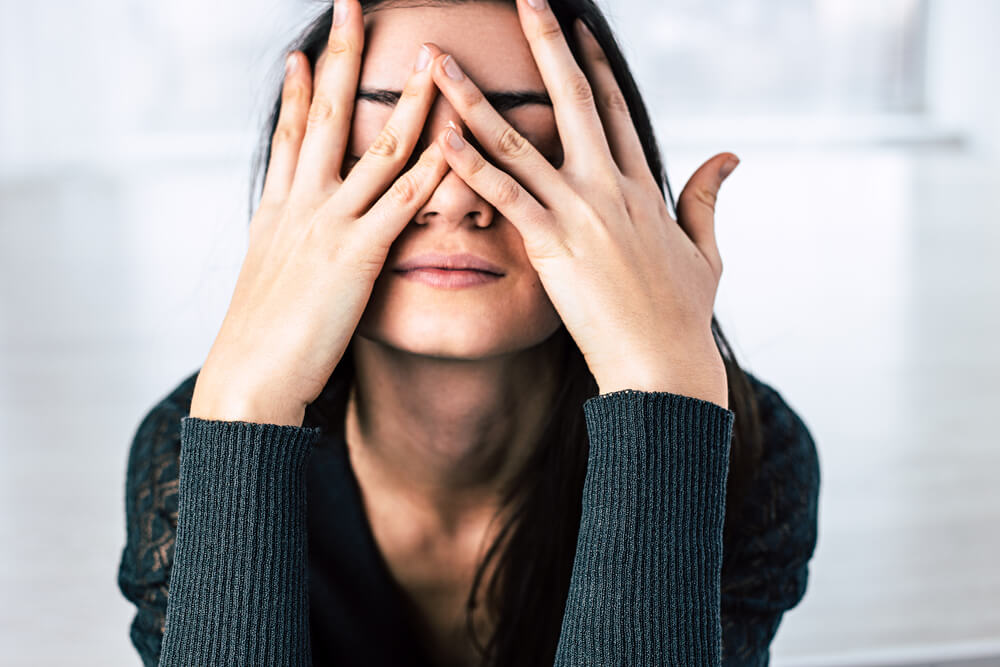
In this day and age, it’s so easy to feel stressed out. You probably already know that all of this stress isn’t good for your mental health, but did you know that it is causing damage to your skin too?
Whenever you feel stressed, your body releases a hormone called cortisol, which is often nicknamed “the stress hormone”. In small amounts, there is nothing wrong with this – cortisol helps your body to deal with stressful situations, and can actually sometimes be pretty helpful.
The issues arise when chronic stress is experienced, meaning that your body has cortisol shooting around it for extended periods of time.
Why does this matter?
Because cortisol breaks down your skin’s collagen and elastin fibers. As mentioned earlier, these are the fibers that are responsible for how smooth and tight your skin is – the less of these you have, the more wrinkles you will notice.
How to De-Stress
De-stressing is often easier said than done. Everyone has their own stress reduction techniques that work for them – the secret is to find what works well for you. Here are a few things that you can try out the next time you’re feeling stressed:
- Exercise, which helps to lower cortisol levels in the body
- Breathing exercises or yoga, which have been proven to lower stress levels
- Talking to someone about what is stressing you out can help you to find solutions to any problems, while putting your issues into perspective
- Keeping a stress diary will enable you to identify stress triggers, so that you can then work out how to reduce these in your life
- Time management can help to prevent you from feeling so over-whelmed, as can learning to say no to extra, unneeded responsibilities
Sleep Deprivation
How much quality sleep do you get each night?
If your answer is less than seven hours, then it’s time to make a change.
Just one night of poor sleep can lead to a variety of different skin issues, including:
- Dark under-eye circles
- Swollen eyes
- Pale skin
- Fine lines and wrinkles that are more visible
Research shows that two days of poor sleep increase those symptoms even more. Once you start looking into regular sleep deprivation, the results are shocking – your skin barrier ends up severely compromised, which accelerates the aging process.
Why Does the Skin Barrier Matter So Much?
Your skin’s protective barrier sits on the outermost layer of your skin. In addition to protecting your skin from external harm, it also traps moisture within, keeping your skin hydrated.
When your barrier is compromised, your skin loses moisture at a much faster rate, and is also more susceptible to external damage. Both of these contribute to an increase in skin aging, which is something that good quality sleep can easily prevent.
How Much Sleep Should You Be Getting?
Ideally, you should be sleeping for between seven to nine hours each night, but quality matters just as much as quantity. If you are constantly waking up in the middle of the night, this affects your sleep quality – try wearing a fitness tracker while you sleep, as these are great for identifying patterns and problems.
Applying a moisturizer before going to bed can also really help. The time during which you are sleeping is when collagen production is at its highest – this is something that you should try to support and encourage as much as possible.
If you have been looking for a new night cream, give the 24K Multi Vitamin Night Nourishment + Retinol a try – its potent formula will help to support your skin’s functions at night, meaning that you will soon be waking up to a brighter, smoother, and fresher-looking complexion.
Tobacco
It’s common knowledge that smoking is bad for your health, but tobacco also has a direct impact on your skin too.
How?
It basically impairs collagen and elastin production. When your body isn’t able to produce these important proteins, your skin suffers, taking on a more wrinkled and looser appearance.
Smoking also causes free radicals in the skin, which also damage collagen and elastin fibers. This double whammy means that your skin really doesn’t stand much of a chance if you’re a regular smoker.
Of course, quitting the habit is the best way to stop of all of this damage in its tracks. For some, that may take some time – in the meantime, try to include plenty of antioxidants in your skin care routine. Not only will these help to somewhat counter the damage that the tobacco is causing, but they will also promote collagen and elastin production, hopefully bringing this back up to a higher level.
Pollution
There are numerous studies out there that have confirmed a solid link between pollution and skin aging, and this is something that only seems to be getting worse around the world. Air pollution is the biggest culprit, with the more polluted cities around the world also experiencing a larger rate of premature aging, along with other skin conditions, such as hives and eczema.
Even if you live in a more isolated, rural area, you still need to worry…
With the amount of pollution in the more congested areas, it doesn’t take much for the wind to spread those particles far and wide, meaning that just about everyone in the world will be exposed to the aging effects of pollution.
How Does Pollution Accelerate Skin Aging?
The exact mechanisms that cause pollution to exacerbate skin aging are still being understood. However, experts all agree that there are several different pollutants that can quickly enter into the skin, triggering an inflammatory response.
Some of them cause dark spots to appear, while others increase the size of blood vessels, meaning redness and even rosacea. Some also destroy the collagen and elastin in the skin, leading to skin laxity and wrinkles.
The best way to counter this is through cleansing. This should always be done at the end of the day, as this enables you to wash away any pollutants that have built up on your skin throughout the course of the day.
Try to look for a gentle yet powerful cleanser, such as the 24K Vitamin C Facial Cleanser. In addition to cleansing, this antioxidant-rich formula will also help to repair some of the damage that pollutants have caused, and it is gentle enough to be used every day.
Experts used to believe that skin aging was largely down to genetics, but more and more studies are showing how untrue that actually is. While genetics does play a small role in how your skin ages, these six external factors are far more influential. In a way, this is a great news – while you can’t do much about your genetics, external factors are much more under your control, giving you the opportunity to slow down your skin’s aging process and enjoy a younger-looking complexion for many years to come.


